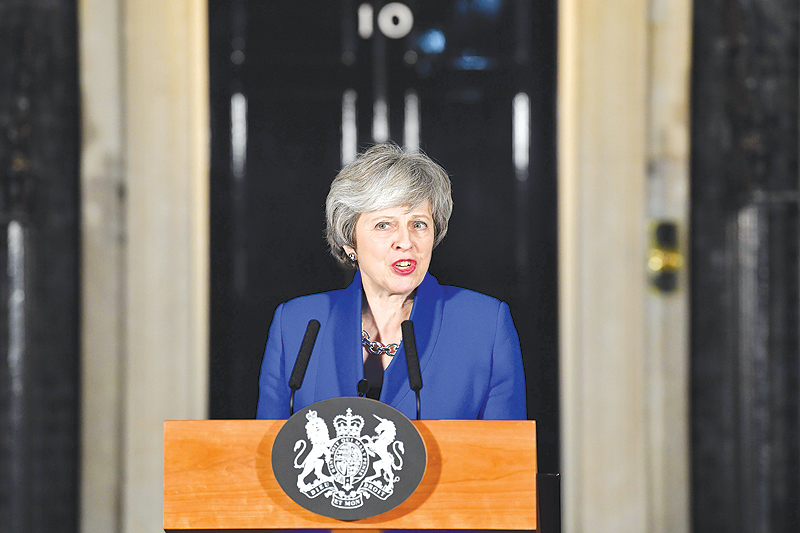Opponents set out list of demands for cooperating

LONDON: British Prime Minister Theresa May faces deadlock yesterday over a new Brexit plan, after narrowly surviving a no-confidence vote sparked by the crushing defeat of her EU withdrawal deal. With the clock ticking, May has appealed to opposition leaders to meet for cross-party talks before she presents an alternative proposal to parliament on Monday.
But her opponents have set out a list of demands for cooperating-including ruling out the possibility that Britain would leave the EU in March without any deal at all. The embattled leader conceded the divorce terms she struck with the EU had been roundly rejected, after MPs delivered the heaviest government defeat in parliament in modern British political history on Tuesday - 432 votes to 202.
"Now MPs have made clear what they don't want, we must all work constructively together to set out what parliament does want," May said in a televised address to the nation on Wednesday evening, after winning a no-confidence vote triggered by the opposition Labor party. She set out a schedule of cross-party talks that began immediately with meetings with the Scottish nationalist, Welsh nationalist and the pro-EU Liberal Democrat leaders.
"We must find solutions that are negotiable and command sufficient support in this House," she had told parliament earlier. But opposition Labor leader Jeremy Corbyn said he would only meet May if she could "remove clearly, once and for all the prospect of the catastrophe of a no-deal Brexit". May said she was "disappointed" by Corbyn's decision and stressed that "our door remains open". On Wednesday evening her spokesman said the possibility of a "no deal" was still on the table.
Ian Blackford of the Scottish National Party (SNP) said his party would only participate if she were prepared to consider delaying Brexit, ruling out a "no deal" and the option of holding a second referendum. May has flatly rejected a second vote.
Late-night talks
The prime minister is working to the tightest-possible deadline as Britain prepares to leave the bloc that for half a century defined its economic and political relations with the rest of the world. Her defeat sparked warnings from European leaders that the prospect of "no deal" had increased, with the potential for huge economic disruption on both sides of the Channel. May must return to parliament on Monday with a Plan B that she and her team intend to negotiate with various MPs through the weekend.
Her offer to meet with the opposition "rings hollow without evidence of her readiness to compromise on the substance of Brexit", the Guardian newspaper said, pushing for a "menu of options" to be presented to parliament. Meanwhile the Daily Telegraph warned that parliament "may be planning a betrayal". "After two-and-a-half years, Plan B is to let parliament take over," the Telegraph said. "At least it is a plan; but is parliament capable of delivering on the referendum result, or is this the start of a great betrayal of that vote?"
Divorce delay?
May survived the no-confidence vote Wednesday thanks to the support of members of her Conservative Party and its Northern Irish allies in the Democratic Unionist Party (DUP). But more than a third of the Conservatives and all 10 DUP members of parliament voted against her Brexit arrangements on Tuesday-each for their own reason. May will therefore tread carefully as she tries to win over opposition lawmakers-many of whom want to remain in the EU-while also attempting to appease more hardened Brexit-backing coalition partners.
She stuck to two key principles on Wednesday: limiting EU migration and pursuing an independent trade policy. Both points rule out Labor hopes of membership of an EU customs union or its single market. Yet she also hinted at the possibility of delaying Brexit. May said the EU would allow this "if it was clear that there was a plan that was moving toward an agreed deal".
EU officials have said extending the negotiating period could be possible until the newly elected European Parliament meets in July. On Thursday, the pound edged up against the dollar with dealers optimistic that Britain will not leave the EU without a deal in place, despite May's exit plan being thrown out by MPs.
Blurred lines
European leaders have repeatedly said they will not reopen the draft withdrawal agreement sealed at a special Brussels summit in December. French President Emmanuel Macron suggested the EU might be willing to tweak a few minor points-but only if they did not alter the bloc's existing position on trade and borders. "We won't, just to solve Britain's domestic political issues, stop defending European interests," he said.
German Chancellor Angela Merkel said there was time for talks as long as London could present a clear and united position. And Irish Prime Leo Varadkar added "that if the United Kingdom were to evolve from its red lines on the customs union and on the single market, that the European Union could evolve also".--AFP









